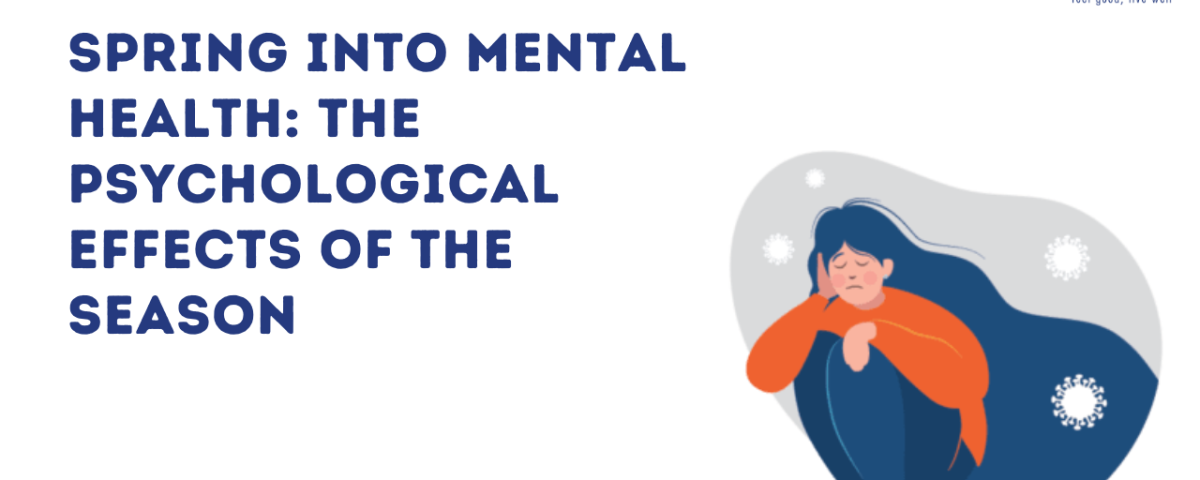Spring into Mental Health: The Psychological Effects of the Season
Spring, the season of rebirth, blossoms, and warmer temperatures, is often heralded as a time of renewal and rejuvenation. As flowers bloom and days become longer, there’s an underlying psychological transformation that many people undergo. From the depths of winter’s often sombre mood, the fresh start that spring offers can play a significant role in our mental health. Let’s delve into this phenomenon and unpack the ways spring impacts our psyche.
-
Seasonal Affective Disorder (SAD) and Spring Relief
While many associate Seasonal Affective Disorder (SAD) with winter, it’s crucial to note that spring can usher in relief for those affected. SAD is characterised by depressive symptoms that appear and escalate during specific seasons. For the majority, it occurs in winter when the days are short, cold, and dark. But as spring emerges, the increased sunlight exposure can boost serotonin levels in the brain, acting as a natural antidepressant for many. This “lift” in mood is a tangible and welcomed transition for those battling winter-induced SAD.
-
The Symbolism of Renewal
Psychologically speaking, humans are naturally inclined to associate spring with new beginnings. This perception is not just cultural but is also tied to our evolutionary instincts. Historically, springtime was a period when food became more plentiful after a scarce winter. This connection to abundance and growth can lead to a mental shift where individuals are more inspired to set new goals, embark on fresh projects, or simply declutter their surroundings and minds.
-
Nature’s Therapeutic Touch
Engaging with nature, which is especially inviting during spring, offers various mental health benefits. The Japanese practice of ‘Shinrin-yoku’ or ‘forest bathing’ emphasises the therapeutic effects of spending time amidst trees and nature. Numerous studies suggest that such practices can lower cortisol levels (a stress hormone), improve mood, and reduce feelings of anxiety. As springtime beckons us outdoors, the simple act of walking through a park or tending to a garden can act as a balm for our mental well-being.
-
Physical Activity and Mental Health
Spring’s warmer temperatures and the allure of the outdoors naturally encourage increased physical activity. From a psychological standpoint, exercise is a potent tool against depression and anxiety. It releases endorphins – chemicals in the brain that act as natural painkillers and mood elevators. As individuals become more active in spring, whether it’s through jogging, cycling, or even just longer walks, the uptick in physical activity can greatly benefit their mental state.
-
The Allergen Effect
It’s important to note that not all spring-related changes are positive for everyone’s mental health. The increased pollen count can lead to allergic reactions in many individuals. Symptoms like fatigue, congestion, and general discomfort from allergies can indirectly affect mood and overall mental well-being. While springtime can be uplifting, those with allergies might have a slightly more challenging experience and should be proactive in managing their symptoms.
-
Adjusting to Change
As much as we might romanticize the idea of spring, any change – even a positive one – requires an adjustment period. The shift from winter’s stillness to spring’s vibrancy can be overwhelming for some. People might feel pressured to match the season’s energy or be productive. Recognising that it’s okay to transition at your own pace is vital. Just as every flower doesn’t bloom simultaneously in spring, it’s perfectly natural for individuals to take their time adjusting to the new season.
Spring, with its undeniable charm, influences our mental health in myriad ways.
The season offers a break from winter’s grip, encourages engagement with nature, and promotes physical activity – all factors that can boost our mood and mental well-being. However, it’s essential to approach the season with self-awareness, acknowledging that while many find joy in spring’s embrace, it might not be everyone’s experience.
As we immerse ourselves in the wonders of spring, let’s remember to be compassionate to ourselves, recognise our feelings, and take proactive steps to nourish our mental health. After all, just as nature blossoms in its time, so do we.
Trouble finding compassion?
Taking the steps to flourish, and nourish our mental health takes time, dedication and sometimes a helping hand. Being compassionate to ourselves, and changing our internal voice, can be difficult, especially when we haven’t spoken to ourselves any other way! But finding compassion and speaking positively to ourselves can be done!
We have constructed some blogs that include steps and tips to change our internal monologue, here & here.
However, sometimes we do need that extra bit of help. At CBT Professionals, we pride ourselves in therapy that focuses on you, and your unique case. Contact us now via telephone or online enquiry via www.cbtprofessionals.com.au to book. Our knowledgeable psychologists can help you through the process of finding the right psychologist for you and help you schedule a convenient appointment time.
Our team is here to support you, reach out!
Reach out to us today:
Helensvale: (07) 5551 0251
Mount Gravatt: (07) 3102 1366
Nerang: (07) 5668 3490
If you, or someone you know, require help, please reach out to organisations like Beyond Blue. Additionally reach out to these organisations that may be able to help.
- ReachOut (youth mental health service) — online help
- SANE Australia — call 1800 187 263
- Mental Illness Fellowship of Australia (MIFA) — call 1800 985 944
- LifeLine 13 11 14 — for anyone in crisis
(Health Direct, 2020).
If this is an emergency, please contact 000 or visit your local emergency department.
Disclaimer: Content on this website is provided for education and information purposes only and is not intended to replace advise from your doctor or registered health professional. Readers are urged to consult their registered practitioner for diagnosis and treatment for their medical concerns.
THREE CONVENIENT LOCATIONS
MOUNT GRAVATT
Mt Gravatt Medical PrecinctSE 105, 1808 Logan Rd
Upper Mount Gravatt QLD 4122


